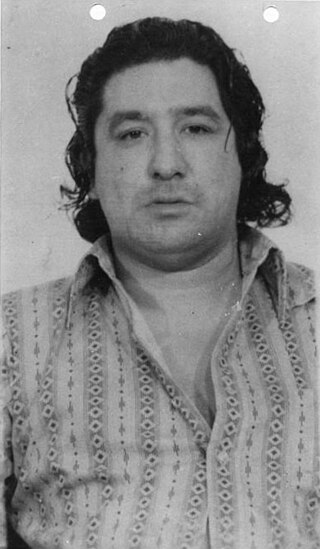
Leonard Peltier is a Native American activist and a member of the American Indian Movement (AIM) who was convicted of two counts of first degree murder in the deaths of two Federal Bureau of Investigation (FBI) agents in a June 26, 1975, shooting on the Pine Ridge Indian Reservation in South Dakota. He was sentenced to two consecutive terms of life imprisonment and has been imprisoned since 1976. Peltier became eligible for parole in 1993. As of 2024, Peltier is incarcerated at the United States Penitentiary, Coleman, in Florida.
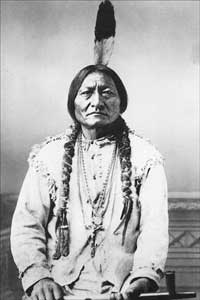
The Sioux or Oceti Sakowin are groups of Native American tribes and First Nations people from the Great Plains of North America. The Sioux have two major linguistic divisions: the Dakota and Lakota peoples. Collectively, they are the Očhéthi Šakówiŋ, or "Seven Council Fires". The term "Sioux", an exonym from a French transcription of the Ojibwe term Nadowessi, can refer to any ethnic group within the Great Sioux Nation or to any of the nation's many language dialects.
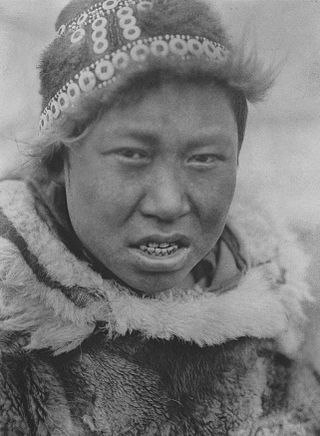
The Yupik are a group of Indigenous or Aboriginal peoples of western, southwestern, and southcentral Alaska and the Russian Far East. They are related to the Inuit and Iñupiat. Yupik peoples include the following:

The American Indian Movement (AIM) is an American Indian grassroots movement which was founded in Minneapolis, Minnesota in July 1968, initially centered in urban areas in order to address systemic issues of poverty, discrimination, and police brutality against American Indians. AIM soon widened its focus from urban issues to many Indigenous Tribal issues that American Indian groups have faced due to settler colonialism in the Americas. These issues have included treaty rights, high rates of unemployment, the lack of American Indian subjects in education, and the preservation of Indigenous cultures.
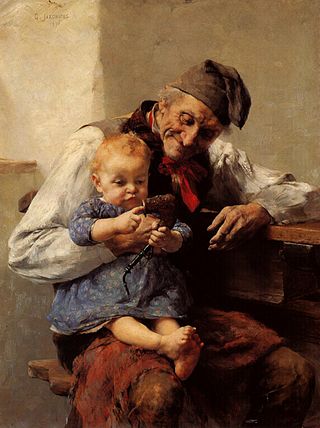
Grandparents, individually known as grandmother and grandfather, or Grandma and Grandpa, are the parents of a person's father or mother – paternal or maternal. Every sexually reproducing living organism who is not a genetic chimera has a maximum of four genetic grandparents, eight genetic great-grandparents, sixteen genetic great-great-grandparents, thirty-two genetic great-great-great-grandparents, sixty-four genetic great-great-great-great-grandparents, etc. In the history of modern humanity, around 30,000 years ago, the number of modern humans who lived to be a grandparent increased. It is not known for certain what spurred this increase in longevity, but it is generally believed that a key consequence of three generations being alive together was the preservation of information which could otherwise have been lost; an example of this important information might have been where to find water in times of drought.

Falealupo is a village in Samoa situated at the west end of Savai'i island 20 miles (32 km) from the International Date Line used until 29 December 2011. The village has two main settlements, Falealupo-Uta, situated inland by the main island highway and Falealupo-Tai, situated by the sea. The road to the coastal settlement is about 9 km, most of it unsealed, from the main highway. The village's population is 545.

Kamla Persad-Bissessar ; born Kamla Susheila Persad, 22 April 1952), often referred to by her initials KPB, is a Trinidadian lawyer, politician and educator who is the Leader of the Opposition of Trinidad and Tobago, political leader of the United National Congress (UNC) political party, and was the prime minister of Trinidad and Tobago from 26 May 2010 until 9 September 2015. She was the country's first female prime minister, attorney general, and Leader of the Opposition, the first woman to chair the Commonwealth of Nations and the first woman of Indian origin to be a prime minister of a country outside of India and the wider subcontinent.

Spider Grandmother is an important figure in the mythology, oral traditions and folklore of many Native American cultures, especially in the Southwestern United States.
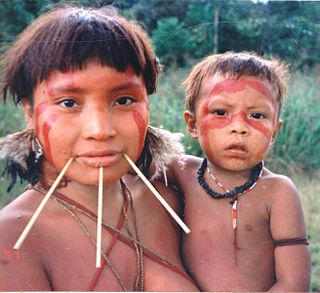
The Yanomami, also spelled Yąnomamö or Yanomama, are a group of approximately 35,000 indigenous people who live in some 200–250 villages in the Amazon rainforest on the border between Venezuela and Brazil.
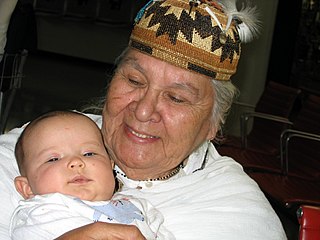
Agnes Emma Baker Pilgrim was a Native American spiritual elder from Grants Pass, Oregon. She was the oldest member of her tribe, the Takelma. She was also the granddaughter of Jack Harney, the first elected Chief of the Confederated Tribes of Siletz. Pilgrim was Elected Chairperson of the International Council of 13 Indigenous Grandmothers at its founding in 2004. "She was honored as a "Living Treasure" by the Confederated Tribes of Siletz, and as a "Living Cultural Legend" by the Oregon Council of the Arts."
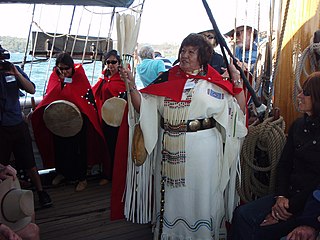
Margaret Behan is a Native American artist and a former member of the International Council of 13 Grandmothers.
Rita Pitka Blumenstein was the first certified traditional doctor in Alaska. She worked for the Alaska Native Tribal Health Consortium. Blumenstein was a member of the International Council of 13 Indigenous Grandmothers—a group of spiritual elders, medicine women and wisdom keepers—since its founding in 2004.
Tsering Dolma Gyaltong was a Tibetan spiritual leader living in exile in Toronto, Ontario, Canada. Tsering was a Founding Member of the Tibetan Women's Association and participated in its re-establishment in 1984.
Beatrice Long Visitor Holy Dance was an Oglala Lakota speaker and activist from the Pine Ridge Reservation in South Dakota, best known for her participation in the group known as the International Council of 13 Indigenous Grandmothers, which was founded in New York in 2004. In 2008, The 13 Indigenous Grandmothers, including Beatrice, hand delivered a petition to Pope Benedict XVI asking to revoke the three papal bulls authorizing the conversion and subjugation of the Indigenous Peoples of America. This letter went unanswered.
Rita Long Visitor Holy Dance is a Native American spiritual elder who is a member of the Oglala Lakota Tribe and comes from the Pine Ridge Reservation in South Dakota. Through her work as an indigenous elder stateswoman, Rita has gained international recognition through her work as part of the International Council of 13 Indigenous Grandmothers - a group of spiritual elders, medicine women and wisdom keepers since its founding in 2004.
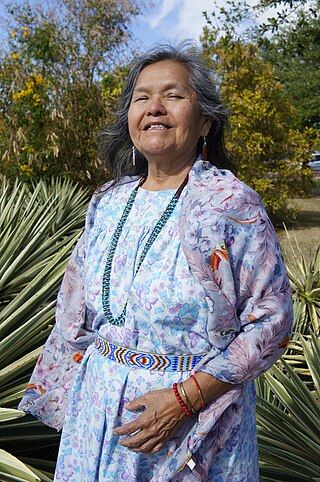
Mona Polacca is a Native American spiritual elder from Arizona. She has worked to further social justice for indigenous people from an early age. She is an author in the field of social sciences, has held posts of responsibility as Treasurer for her tribe, served on several committees for Indigenous Peoples within the United Nations. and is widely known for her "leadership in the Native American revitalisation movement."
Marie (Nick) Arnaq Meade is a Yup'ik professor in the humanities and also a Yup'ik tradition bearer. Meade's Yup'ik name is Arnaq which means "woman." She also works and travels with the International Council of Thirteen Indigenous Grandmothers. Meade is also part of the Nunamta Yup'ik Dance Group. Meade has been documenting the cultural knowledge of Yup'ik elders, including the values, language and beliefs of the Yup'ik people for over twenty years. She is currently an instructor at the University of Alaska Anchorage.

The Catholic Church and race refers to the teachings, practices and approaches of the Catholic Church in regard to the human races. The core teaching of the Catholic Church on human beings, is that all of the races of mankind are required to convert to the Catholic faith to attain eternal salvation. The foundational break between Christianity and Rabbinic Judaism on human beings is that since the Incarnation of Jesus Christ, the new covenant with the God, is based not on the concept of a tribal, hereditary definition of a chosen people by blood which excludes gentiles, but on faith and belief, accessible to all of the races of man.













